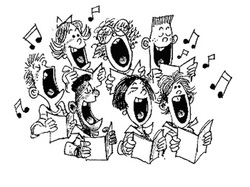 Our Best of British concert is over and I think everyone was very happy with the way we performed. Not a large audience (sometimes a lovely day can be a drawback for a concert day!) but a very appreciative audience. Di had us perform the last item with no music, something we haven't done for a long, long time and guess what? We all coped. I think it is something that we should endeavour to do more often as there is considerable benefit to be had in both the process and the end result. In a sense, some members of the choir who don't read music already do this to a large degree, although they still have the words to refer to. Being music-less requires that you know the music thoroughly, especially the length of rests and in phrases that are similar but slightly different (I'm thinking of Rutter's 'Gaelic Blessing' here), knowing exactly the note values. Not being able to see where other parts come in - especially those you make use of to know when your own part starts - forces you to really concentrate and, I think, appreciate much more the interweaving of parts. The other important thing that happens is that -gasp!- everyone watches the conductor, all the time. Everyone decrescendos together, comes off the end of the phrase together, resulting in a much more nuanced and effective performance. It reminds us that the music we have in front of us is a reference, not a book to bury our heads in. Next up, our choir joins again with Dunedin's Star Singers and the Central Otago Singers for a concert in Dunedin on 9 September. at the OBHS Auditorium, 2pm. and then we will start preparing for our Christmas concert later this year.
0 Comments
On 4 December the choir was privileged to be part of the world premiere performance of music from 'Let There Be Joy!' a book of music with scottish connections for Advent, Christmas and Epiphany, edited by Dr Raymond White. The book was published earlier this year along with a book of keyboard music 'A Kist o' Whistles.
We were accompanied by a chamber orchestra lead by Dean Hollebon, together with the chamber organ played by Dr White and Gregory Peyroux. I have to say this would have been one of the more difficult concerts to prepare for, mainly due to the unfamiliarity of some of the words and the way that many words are stressed differently to what we are accustomed. Take the first verse of Rorate, Celi. Desuper! : Rorate, celi, desuper Hevins distill your balmy schouris for now is rissin the brycht day ster from the ros Mary, flour of flouris The cleir sone quhome no clud devouris surminting Phebus in the est is sumin of his hevinly touris et nobis puer natus est. Dr White was very patient with us while we came to grips with pronunciation and style. Unlike our usual sort of music, where we pencil in markings above or below the notes, our books instead had marks over the words which were all written on the facing page. It was neccesary to learn the tune quickly so that you could concentrate on the words. I'm sure in the first few rehearsals we would have looked like a crowd watching a tennis match! The hard work paid off and I think we gave a creditable performance, with excellent accompaniment provided by a chamber orchestra. We had a gratifyingly large crowd who certainly seemed to appreciate the music. The writer made her conducting debut which has made her appreciate even more the amazing job done by our musical director Di Lenihan! There is a split-second of terror prior to the first note the choir sings, wondering if you have given them the right signals so that they will come in. |
AuthorI'm a soprano :) Archives
May 2017
Categories
All
|
 RSS Feed
RSS Feed
